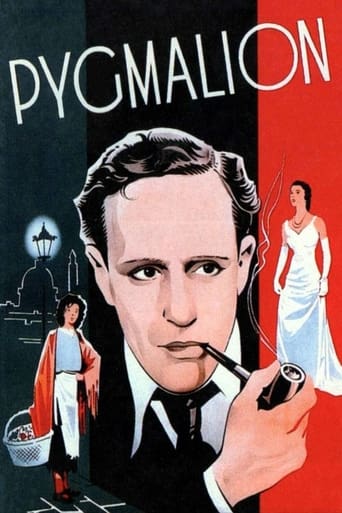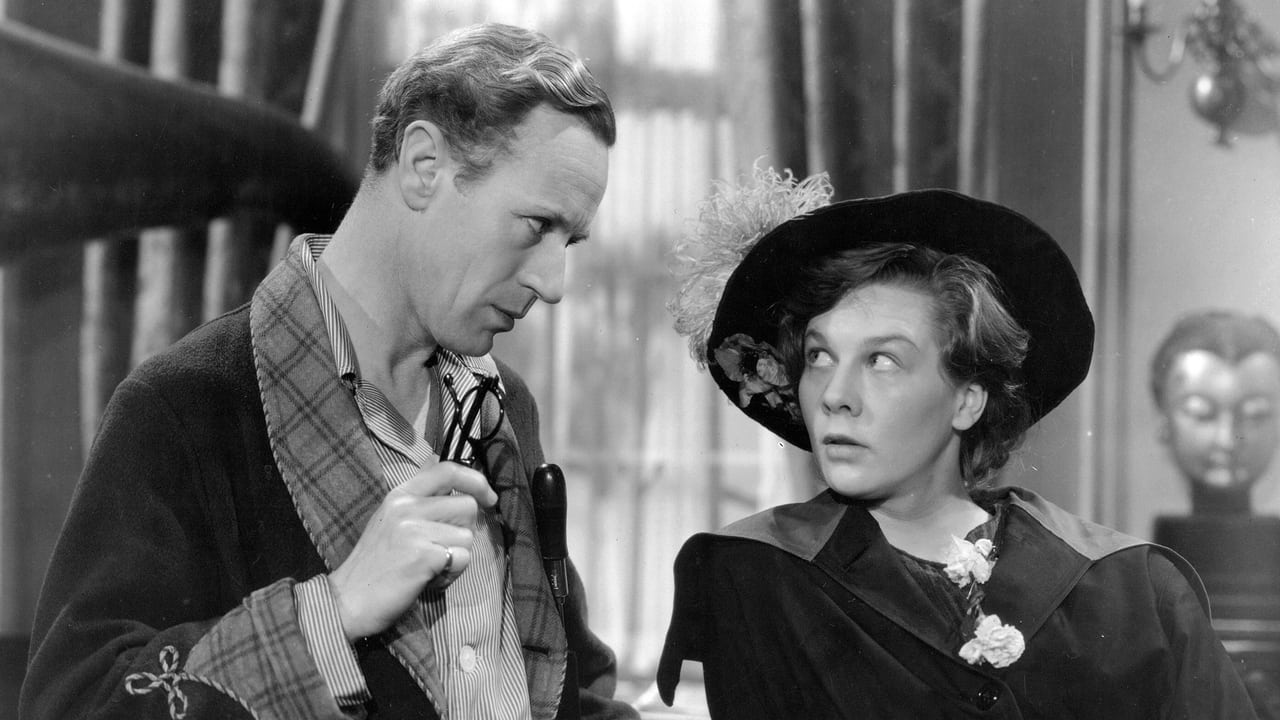Tad Pole
. . . that "Eliza Doolittle" is driven back to Leslie Howard's self-styled modern Pygmalion, Professor of Phonetics Henry Higgins. This despite the fact that the future "Ashley Wilkes" (Leslie Howard) uses the "D-word" a dozen times more than Clark Gable's Rhett Butler would the following year in GONE WITH THE WIND. (That's because England was about a dozen times more "free" than America back in the 1900s.) Eliza's wavering between misogynist "confirmed bachelor" Henry and Freddy's Mr. Giggles is understandable, since Oscar-winning screenwriter George Bernard Shaw included an "afterword" about 50 pages long with the book version of his original PYGMALION stage play explaining why he thought Freddy--NOT Henry--must wind up with the flapper version of Galatea, Eliza. Emerson said a foolish consistency is the "hobgoblin" of little minds, which excuses Shaw's ambivalence. Bernie had a great big brain--so vast that he's the only screenwriter in movie history to have a Nobel Prize on his mantle. When you watch PYGMALION, you'll realize Shaw handed Lerner and Lowe the musical openings and half the actual lyrics to their eventual 1964 "Best Picture" screen musical remake of this story: MY FAIR LADY.
James Hitchcock
George Bernard Shaw's play "Pygmalion" was written in support of his controversial thesis that class divisions in British society could be overcome by encouraging the use of Received Pronunciation (supported by reformed spelling in a phonetic alphabet) in place of regional and class accents. Today such an idea would doubtless be attacked as snobbish and reactionary, but in 1912 Shaw clearly intended it to be enlightened and progressive. The story concerns Henry Higgins, an upper-class professor of phonology, who accepts a bet that he can teach a Cockney flower-seller to speak like a duchess and pass her off as one at an Embassy reception. The title was taken from a Greek myth about a sculptor who creates a beautiful statue which the gods transform into a real woman; the implication is that Higgins is the sculptor and Eliza his "creation". (I remember misunderstanding the title when I was taken to a performance as a child and found myself wondering why, in a play called "Pig Malion", pigs were never mentioned once).This film, dating from 1938, was the first cinema adaptation of the play. Although it was a financial and critical success in its day, its fame has today largely been overshadowed by that of the 1964 musical version "My Fair Lady". The screenplay was adapted by Shaw himself from his play, although the ending was changed against his wishes, with Eliza returning to Higgins' home in such a manner as to suggest a romantic attachment between them. The original play ended with Eliza marrying her admirer Freddie Eynsford-Hill, a wealthy but vapid and foolish young man, and Shaw strongly resisted any attempts by actors or theatrical producers to change this ending. In "My Fair Lady" it seems at first as if the audience are being prepared for Shaw's original ending; Freddie is made more attractive, both in looks and in personality, and he gets to sing one of the film's big romantic numbers, "On the Street Where You Live". That film, however, also ends with Eliza returning to Higgins.There was a reason why Shaw resisted attempts to turn "Pygmalion" into a romantic comedy. (He seems to have deliberately ignored the fact that in the original myth Pygmalion fell in love with and married his creation Galatea). Besides social class, the play also deals with the theme of feminism, with Eliza seen as a strong, determined "new woman" who learns to stand up for herself after being bullied first by her drunken, womanising old reprobate of a father and then by Higgins, a crashing snob and misogynist. (He regards Eliza as a "guttersnipe" and has no qualms about calling her one to her face). The attraction of Freddie for her is precisely that he is a weak character and therefore unlikely to bully her.This film updates the action from the 1910s to the 1930s (although some of the costumes look a bit old-fashioned for the latter period) and makes a few other changes to the plot of the play, some of which were retained in "My Fair Lady", such as the invention of the Hungarian Professor Karpathy. Shaw, however, kept his controversial line "Not bloody likely!", making Wendy Hiller the first person to utter that particular profanity in a in a British film; rather surprisingly the censors appear to have raised no objection. One thing the makers of this film got right, unlike the American makers of "My Fair Lady, is the pronunciation of the name "Eynsford", originally a Kentish village. (It's "Ainsford", not "Inesford").Hiller was reputedly Shaw's favourite actress and was certainly something of a specialist in Shavian drama at a time when performances of his works on the London stage were more frequent than they are today; her next film, "Major Barbara", was also a Shaw adaptation. It is therefore unsurprising that she makes a fine Eliza, perhaps closer to Shaw's original conception than Audrey Hepburn who always seems more convincing as the society lady of the later scenes than as the Cockney of the earlier ones. Leslie Howard is certainly a better Higgins than Rex Harrison, who was too old and too laid-back; I have never understood why he won the "Best Actor" Oscar, especially as his singing voice was not really up to taking the male lead in a musical.In his lifetime, Shaw was held in very high esteem as one of the greatest British dramatists of all time, at times regarded almost as a twentieth-century Shakespeare. Since his death his reputation has declined somewhat, although a number of his plays, "Pygmalion" among them, still hold a popular place in the repertoire. He was able to create witty dialogue and interesting characters, even when he was writing a didactic piece, which most of his plays are, and this is particularly true of "Pygmalion". Antony Asquith's film is a worthy adaptation of this distinguished play for the cinema. 8/10
bob-790-196018
This is a four-star movie in the various video guides, but not for me. True, there is much to like. It can be very funny. But two-thirds of the way through the film I began finding the Henry Higgins character unbearably dense--for all his brilliance--and tiresome.Here Eliza Doolittle has been transformed into a veritable princess, but for Higgins this just means he's won his bet with Pickering. He can't see the beauty that's right in front of him. For that matter, throughout the film he cannot see the human woman that's right in front of him; he treats her like an object and is downright mean.Higgins strikes me as the sort of irascible eccentric that we are meant to find delightful and, when all is said and done, endearing. It's been my belief that eccentrics are tiresome because they really have no sense of what they look like to others and in fact don't really care that much about others. They're too busy riding some behavioral or mental hobby horse. And that's what makes them eccentric.Wendy Hiller is wonderful as Eliza, both pre- and post-Higgins. I don't see anything funny about the way Higgins treats her character.I don't know anything about G.B. Shaw other than this film derived from one of his plays. It doesn't make me want to find out more about his work.
Arcturus1980
I prefer this to the much-enjoyed 1964 musical, My Fair Lady. The delightfully lavish musical says as much in roughly double the time. Howard and Hiller are brilliant here, as are Harrison and Hepburn in My Fair Lady. I can't favor one pair over the other. However, Esme Percy as the Count is more amusing than his counterpart, Theodore Bikel.I agree with the controversial ending. Eliza had come too far to leave Higgins for Freddy, a comparative dolt. To my mind, it wraps up this witty picture appropriately. There is no telling how many more great Leslie Howard roles there would have been, had he not been a casualty of that awful dustup World War II.


 AD
AD



